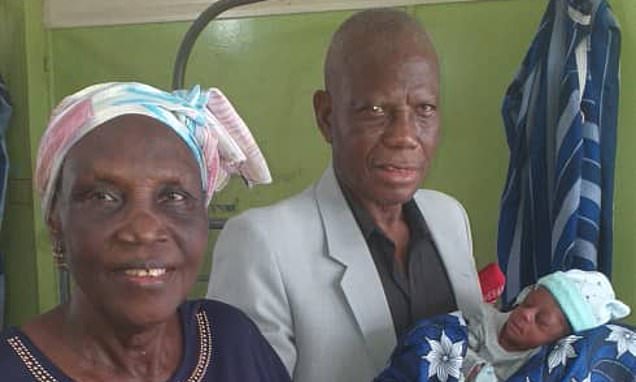
Margarett Adenuga Nigerian woman, 68, gives birth to twins w/ 70 year old Lagos husband after 43 years of trying, despite childbirth risks.
It was bound to happen and it finally did after 43 years …
A 68-year-old Nigerian woman and her 70-year-old husband have told of their elation after giving birth to twins after 43 years of trying.
Margarett Adenuga gave birth to the children – a boy and a girl – by cesarean at a hospital in Lagos on April 14, and is reported to be doing well.
Husband Noah, 70, revealed that she fell pregnant last year via IVF after three previous rounds of treatment failed.
He told Nigeria’s TVC News that the couple were inspired to keep going by a dream he had in 1996 that told him he would be ‘known across the world.’
The dailymail reports that the 70 year old father acknowledging that a group of fertility doctors had warned him that it was dangerous for his wife to go ahead with the pregnancy.
But he added that the decision was private and not the doctor’s concern.
Nigerian couple persevered with pregnancy despite risks:
Lagos University Teaching Hospital said the IVF treatment was carried out elsewhere and the couple were only referred to them for treatment afterwards.
Medics continued to monitor Margarett throughout the pregnancy, until she opted to undergo surgery at 37 weeks.
The hospital said it was the first case of pregnancy in a woman of her age they had dealt with.
Attending physician Dr Adeyemi Okunowo called the birth ‘a miracle’ while stressing that the couple took a huge risk going ahead with the pregnancy.
It is not clear exactly where the most recent treatment was carried out, but Noah revealed that the couple previously travelled to the UK for a procedure.
IVF involves fertilized eggs being implanted into a woman’s womb and is used to overcome a range of issue than can make it hard for couples to conceive naturally.
The procedure can be carried out using a couple’s own sperm and eggs, or those from donors.
According to the British NHS, the chance of success for a single round of IVF range from 30 per cent for those under 35 – to 2 per cent for those over 45.
More than one embryo is usually implanted at a time to increase chances of success, which means that IVF is significantly more likely to result in multiple-pregnancies compared to natural conception.






